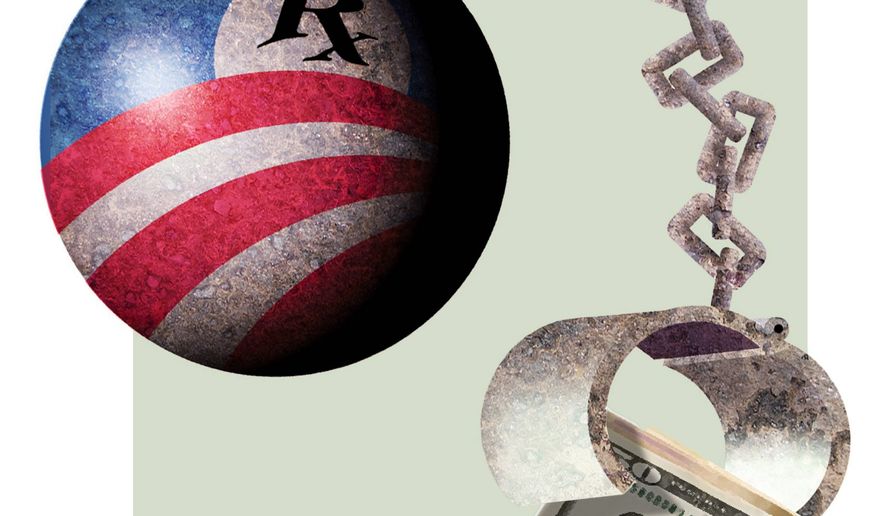The anti-liberty lobby
By Richard W. Rahn - - Monday, July 3, 2017
ANALYSIS/OPINION:
Why do so many propose policies that undermine the never-ending quest to create a government that ensures liberty and protects person and property, as envisioned by the American Founders? Is it out of a desire for political power or ignorance of the consequences of their proposals?
This past weekend, there was a segment on National Public Radio, where the reporter asked a number of people who identified as Democrats what their party stood for. Several responded, “It is a work in progress,” and others presented a few, feel-good, non-operational generalities requiring more government spending — but all agreed that they must oppose President Trump, for whatever reasons.
No one mentioned liberty. In fairness, if a group of Republicans had been asked what their party stood for — many of the answers would have been equally incoherent. Most Republicans used to stand for a more limited government and lower taxes, yet many Republican senators are now talking about supporting a health care “replacement” that would leave in place many of the Obamacare taxes.
Sen. Bernie Sanders keeps repeating that “all Americans have a right to health care” — nice applause line, but what does it mean? There is no such right mentioned in the Declaration of Independence or the Constitution.
Health care is not a free good — someone has to pay for it. Ask yourself — who should pay for your health care? And in order to focus your answer, name the specific person, not a useless generalization — such as, the “rich.”
Do you have the obligation to pay for someone else’s health care? If so, how much and why?
There is an insatiable demand for health care, particularly as people get older.
No society is rich enough to pay for all of the health care people want.
Thus, health care must be rationed in some manner — and the only choices are by price, by form of treatment, or by queuing.
Those who say health care should be rationed by price — as we do with restaurant meals and most other things we buy — are accused of being mean to the poor. Those who say that rationing should be done by form of treatment —
e.g., beyond some age, the taxpayer will not be required to pay for hip replacements or a heart transplant — will be accused of being unfair to the older population or those in serious need.
If rationing is done by queuing — that is, waiting in line for a certain operation (because of a scarcity of doctors with the necessary skill or scarcity of the required facilities) — it is claimed this is unfair to those most in need.
Mr. Sanders and his supporters say we should increase the taxes on the “rich” to pay for more health care and all of the other programs they think should be considered rights.
Who are these “rich,” and how did they become responsible for others’ health care? I have a good friend who made considerable money in business on his own and is probably worth some tens of millions of dollars. A couple of years ago, I referred to him as being “rich.”
He strongly denied it and said that he was “comfortable” but to be “rich” you needed to have more than a hundred million dollars.
In some places in Africa and Asia, there are still tens of millions who subsist on less than two dollars a day.
By their standards, the average American on welfare — who has a color TV, dishwasher, air-conditioned apartment and plenty of food — is “rich.”
The point is that “rich” is a relative term —
and there will never be enough rich people to pay for all of the demands of those who think some are entitled to others’ income.
The 13th Amendment to the Constitution prohibits “involuntary servitude” and slavery.
At what point does a tax on someone’s labor — where the proceeds of that tax are largely used to provide income or services to others — constitute “involuntary servitude”?
At various times, many countries, including the United States, have tried to place very high tax rates on the “rich” or others — and it always fails.
The “rich” withdraw their taxable labor by taking more leisure time or move to the shadow economy, or to where they are more lightly taxed.
Those who think they have the right to the labor of those they revile, i.e., the “rich,” have the same mentality of the slaveholder who also thought he had the right to others’ labor.
Liberty is not only being destroyed by taxation and regulation; it is also being destroyed by formal and informal speech codes, particularly on college campuses.
Those who would seek to impose limitations on the free expression of others are actually revealing they have much of the mindset of King George III of England at the time of the American Revolution — who also believed that speech he did not like was impermissible.
Unfortunately, name-calling by politicians and others who cannot think beyond Stage I (that is, the consequences of any policy proposal) and express serious ideas in a way that resonate with people is not new.
Our forefathers did not revolt against the British to get “free” health care or cell phones, but to obtain liberty — which they believed was worth fighting for.
• Richard W. Rahn is chairman of Improbable Success Productions and on the board of the American Council for Capital Formation.
http://www.washingtontimes.com/news/2017/jul/3/anti-liberty-lobby-must-be-stopped/

No comments:
Post a Comment